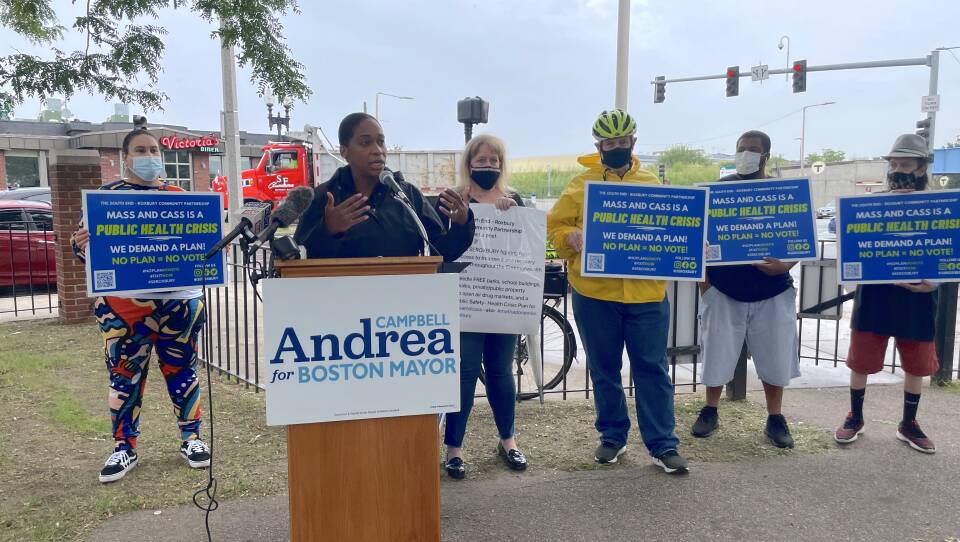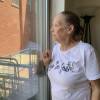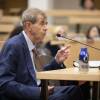A day after the Boston Herald reported the controversial closing of a “comfort station” near the city’s the drug and mental health crisis epicenter, the question of how Boston’s next mayor should address the issue is flaring up on the campaign trail once more, with candidates Andrea Campbell and Annissa Essaibi George each taking to the neighborhood with supporters.
The station, set up last year for the homeless and substance abusing populations to find toilets, tents and hand-washing stations, was shuttered at the end of July.
The area, nicknamed “Mass & Cass” for its proximity to the intersection of Massachusetts Avenue and Melnea Cass Boulevard, has seen an uptick in incidents, with the Boston Police Department reporting five homicides to date in 2021. Last year, when the station was first set up as a pandemic measure, there was only one.
Campbell, who held a press conference at the Clifford Park Playground Wednesday, said she was “deeply disappointed” to learn through the media that Acting Mayor Kim Janey’s administration had permanently closed the comfort station since the area's inhabitants need spots to find services and address sanitation issues.
“We don’t need places closed, we need them re-opening. We just don’t need it centralized in this particular area,” Campbell said.
Hours later, Essaibi George walked the area as part of her week-long “hard conversations” tour. She said closing the comfort station was “necessary,” but the next step is decentralizing services in the area, then pairing suffering people with those services.
“We are not doing nearly enough,” she said to reporters. Essaibi George’s plans to address the area include setting up new syringe service programs to diffuse the concentration of needles and creating a consumer advisory board of people in long-term recovery to inform the city’s response.
Campbell pointed to the uptick in violence and described the issue of Mass & Cass as one concerning both public health and public safety. She said, though, she does not support a repeat of the 2019 Operation Clean Sweep, the two-day police mission that saw dozens arrested as the homeless encampment was cleared out.
“I have been hearing rumors about that, and the rumors that I’m hearing are very unsettling,” Campbell said, alluding to whispers of a forthcoming reprise of the operation. “That inhumane response is not the answer.”
Janey’s administration denied that such an operation is in the works.
A coalition of residents with the South End Roxbury Community Partnership were conflicted over how to go about cleaning the area.
“I think we all agree that street sweeping...need to happen for public safety and sanitation, but the way they’ve been executed have been terrible,” said Roxbury resident Marla Smith.
“Even if they’re unhoused, even if they are living in tents, they shouldn’t be living in literal filth…but [street sweeping] needs to be done in a coordinated way such that they do it every Monday, or they do it three times a week,” she said.
Smith said she supports Campbell since she was the first to roll out a plan for addressing Mass & Cass earlier this year.
Another South End Roxbury Partnership member and former Boston resident Yahaira Lopez described herself as “torn.”
“You know that people need help, you know that people deserve better access to treatment and recovery services, but at the same time, it’s like, at whose expense?” she said, saying that her elderly mother, a resident of the area, was once robbed while coming home from work late one night.
“Children in this community can’t even use the park,” Lopez added. “That’s not fair.”
Andrew Brand, a 24-year resident of Mass & Cass, said he also supports Campbell, but still wants to see the area cleaned up.
“I think the [2019] sweep needed to be done, but I don’t think it was done in an effective or fair way,” he said, suggesting “proper arrests” of a presumably small population of bad actors could cut incidents in the area.
Though she does not support a repeat of Operation Clean Sweep, Essaibi George said that Mass & Cass does need both a police response to address its public safety issues, as well as a mental health and substance use treatment response.
Brand, who agrees, blamed the area’s current conditions on former Mayor Marty Walsh, who he described as neglectful.
“Mayor Walsh did no planning and essentially ignored the issue for years, and then when it erupted...then, he got pissed off and did the sweep with as little thought as he had to creating the crisis in the first place,” Brand said.
Campbell, who first debuted a plan to appoint a chief bureaucrat to oversee response and study ferries as an option for shuttling those seeking treatment to Boston’s facilities on Long Island, laid the blame at Janey’s feet Wednesday.
“At the end of the day, the buck stops with the mayor,” Campbell said. “It’s necessary that the acting mayor step up and take action and stop suggesting that things are getting better. It’s not.”






